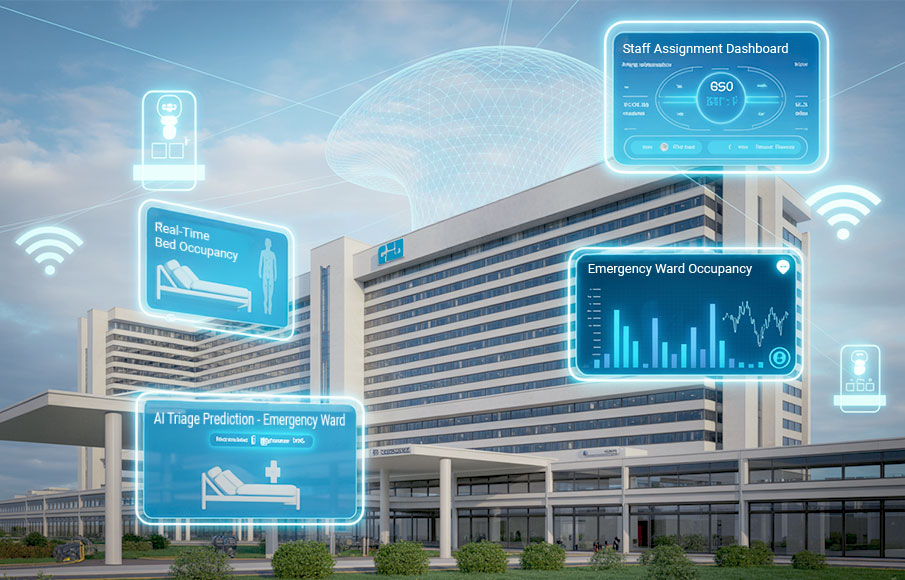AI Innovations Across Industries: Use Cases & Robust Solutions
- 07 July 2025

Artificial Intelligence (AI) is revolutionising industries worldwide, and Singapore is no exception. With nationwide growth in the field projected to reach $4.5 billion by 2030, Singapore stands staunchly in third place worldwide for AI innovation and investment, only behind China and the United States.
As Singapore continues to emerge as a leading hub for AI innovation in Asia, numerous training opportunities and AI-related projects have become accessible as part of Singapore’s digital economy strategy. This shift is actively giving enterprises the opportunity to expand their reach and integrate AI usage into their respective fields. Backed by strong government investment, a rapidly expanding pool of talent, and a collaborative ecosystem, Singapore is set for transformative change across sectors.
But what does this AI-powered transformation look like in practice? In this article, we go over the various ways that leading industries are creating real-world value through AI innovation.
Use Cases of AI in Various Industries
A wide variety of industries have begun using AI innovations to enhance their operational efficiency and increase their reach. Here are three prime examples of key sectors that are experiencing AI-powered transformation:
Education

Singapore’s Ministry of Education (MOE) is making use of AI-enabled technologies such as the Adaptive Learning System (ALS), an AI-driven platform for personalised learning experiences. This platform is intended to analyse each student’s strengths, weaknesses, and learning pace, in order to dynamically adjust lesson content and practice exercises.
The ALS enables students to learn more effectively, without being left behind by a static syllabus. Its usage can support teachers by ensuring that slower students are not left behind, while providing equal support for faster students.
Challenges
However, educational institutions face numerous challenges when using AI to supplement learning. The chief concerns laid out by educational institutions all revolve around data privacy. As a government organisation, the Ministry of Education is highly concerned with data sovereignty, as well as the risk of data breaches and unauthorised access. While some schools rely on public cloud services to operate their AI tools, they tend to run into the aforementioned issues with security, and experience a lack of transparency. The data collected from students and teachers in the process of training generative AI may create severe privacy concerns.
Additionally, when using a system such as the ALS, educators need a stable and consistent internet connection. They also require room to grow and scale, in order to expand the varying subjects they can offer students. The heavy usage across the entire campus internet infrastructure necessitates a reliable partner in connectivity.
Lastly, in order to have AI-powered education function as intended, educators need to respond to feedback and receive support in real-time.
For these reasons, traditional telcos may not be able to fulfil all the requirements that schools rely on for smooth and continued operations.
SPTel’s Solutions For Education
SPTel can resolve these common issues faced by educators, through our various managed services and advanced infrastructure offerings. Our solutions are capable of supporting AI-driven applications such as the ALS while addressing the unique demands that schools face.
Consistency: SPTel’s Edge Cloud delivers a stable and reliable distributed performance architecture by using multiple secure edge nodes strategically located across Singapore. With this design, schools benefit from ultra-low-latency connectivity, as user traffic is routed to the nearest compatible node instead of a centralised and distant data centre. This ensures consistent, high-quality user experiences for all students and educators, even during peak usage periods.
In the event of a fault at any edge location, our Edge Cloud’s built-in resiliency allows for seamless failover to another zone. This backup-as-a-service functionality ensures uninterrupted access to AI-powered learning platforms and enables continuous delivery of digital education services.
Data Governance: SPTel’s Edge Cloud infrastructure is housed within locally owned Critical Information Infrastructure (CII) facilities, providing a highly secure environment that adheres to Singapore’s data protection regulations. This is particularly important when dealing with governmental industries such as the Ministry of Education, as user data needs to be held to the highest standards of privacy.
Real-Time Feedback and Support: To enable the real-time responsiveness required by systems like ALS, SPTel provides high-performance Wi-Fi 7 connectivity solutions. These enterprise-grade wireless access points support high throughput, minimal latency, and stable performance, which is critical for applications that promise real-time automated feedback, adaptive testing, and AI-generated insights.
Scalability: As schools expand their use of adaptive learning tools, data volume and compute requirements will inevitably grow. Traditional public cloud solutions may incur significant data transfer charges as more data is moved between local devices and remote servers.
SPTel’s Edge Cloud architecture avoids this issue by using an as-a-service model. Schools can scale their deployments without worrying about hidden costs or performance bottlenecks. Our pay-as-you-use model offers predictable cost control, while our elastic Edge GPU instances provide the computational flexibility to support growing AI workloads of all sizes.
Through these benefits, SPTel can help organisations excel in the educational field, where others may not be able to keep up. Find out more about how our Edge Cloud Computing can benefit your organisation.
Retail

Cheers, a leading Singaporean convenience store chain, has made a foray into unmanned retail with its cashier-less store at Our Tampines Hub. This store concept allows customers to simply enter, pick up their items, and walk out without needing to scan products or queue at a traditional checkout counter. Behind the scenes, this seamless “grab-and-go” experience is powered by advanced computer vision, ceiling-mounted cameras, weight sensors, and AI algorithms that track each shopper’s selections in real-time by analysing key information.
As customers move throughout the store, smart surveillance systems detect and register the products removed from shelves. Once the customer exits, the amount is deducted automatically from their virtual wallet, creating a frictionless and contactless experience. AI has a vital role in maintaining operational awareness, detecting suspicious behaviour, stock anomalies, or inventory leaks to ensure security and efficiency without on-site staffing.
Challenges
These types of retail stores often face critical challenges when establishing their IoT and AI-powered infrastructure. Firstly, these experimental layouts are compact and restricted to a small space. This means that they cannot utilise on-premise servers for crucial video recordings that monitor and handle theft. While space-efficient smart cameras can substitute these servers, they are costly and impractical to upscale for future operations. Cloud-based alternatives can also be used, but they lack the real-time response speed that is necessary for day to day operational security.
Next, these unmanned stores are unable to deal with network downtime. There are no staff members on hand to manually process payments or respond to anomalies, making it vital for these stores to constantly stay online. Not all service providers are able to guarantee a resilient network with multiple backups/fallbacks.
Finally, unmanned stores will require multiple sensors to work together to feed data into the AI engine. Besides knowing how many people are in the store, what products need replenishing, owners of unmanned stores may also need to know if the store is in tip-top condition e.g. fridge temperatures, water spillage, messy inventory. This will require different sensors to work together for people counting, temperature sensing, asset monitoring and more. However, it may be a hassle to find a multi-protocol device management platform that can support diverse protocols and the varying sensor types needed for operations.
SPTel’s Solutions For Retail
Thanks to our wide variety of connectivity solutions, SPTel can resolve these issues in the retail field, by leveraging cutting edge technologies.
Real-time Processing: SPTel’s Edge Cloud provides low latency services by processing video data in real-time at the network’s edge. This allows for immediate analysis of surveillance feeds, enabling rapid detection and response to security incidents such as theft without the lag associated with distant data centres. Edge Cloud achieves the space-saving purpose of cloud infrastructure, while overcoming the common downside of latency.
Protocol Agnostic IoT Platform: Our IoT Platform can accept input from numerous different types of sensors, regardless of their connectivity requirements, and collate data collected on a common device management platform. This reduces the need for integration and the risk of incompatibility when incorporating data points with analytics into a functional retail environment.
Reliability Through M2M Device Support:
With SPTel’s Multi-Network M2M (Machine-to-Machine) connectivity supporting next generation mobile connectivity requirements of AI driven systems, business owners can rest assured of reliable network support. This Multi-Network M2M SIM solution provides automatic fallover capabilities across 3 major mobile operators in Singapore, ensuring that critical payment and security systems are always connected and operational.
Healthcare

Hospitals such as KK Women’s & Children Hospital are beginning to use AI software to handle urgent requests. Their chatbot, U-Pal, is intended to alleviate the strain of non-critical cases. This software is a paediatric advice provider that helps clinicians prioritise treatment based on the severity of a patient’s medical condition. It does this by allowing parents to list their child’s symptoms, then performs basic triage and provides curated responses.
This program is meant to alleviate the anxiety of parents and caregivers, preventing them from making non-essential trips to the hospital when faced with situations that are not in need of urgent treatment. This reduces the manpower drain on hospital staff and allows clinicians to focus on critical cases.
Challenges
At the moment, existing IT solutions struggle to maintain healthcare AI applications like the U-PAL chatbot. The primary concerns are latency, security, and uptime reliability.
Additionally, such a solution requires high scalability in order to adapt to surges in requests. During events like public health crises, these chatbots may see massive upticks in use, and the system has to be able to cope with an increase in user demand.
Finally, running this software using a conventional network makes it vulnerable to cyberattacks. As an essential medical consultation tool for the hospital, compromising on availability an uptime is unacceptable. A tool that experiences delays in medical care recommendations can have severe real-world impact on its users.
These are all critical areas of concern for mission-critical, always-available, and secure healthcare AI deployments.
SPTel’s Solutions For Healthcare
Using AI for healthcare-related purposes requires a highly secure, resilient, and responsive digital infrastructure. SPTel’s solutions can meet the stringent demands of healthcare AI, supporting mission-critical applications like triage chatbots, remote patient monitoring, and medical imaging analysis.
Security: Users can rely on SPTel’s Managed Security Solutions, which employ threat intelligence, zero-trust principles, and continuous monitoring to safeguard against cyber threats.
Additionally, our Clean Pipe Network service detects and mitigates DDoS attacks in real time, ensuring that organisations will be alerted of attacks as they happen and have the option to mitigate these threats on demand. This ensures that AI reliant applications can continue to remain accessible to those who need them most.
Scalability: SPTel’s business class digital network delivers bandwidth upgrades on demand, within minutes. This enables healthcare organisations to handle sudden unexpected traffic surges such as during a pandemic. Learn more about our solution here.
Mission-Critical Connectivity: For applications like the U-PAL triage chatbot, continuous uptime is non-negotiable. SPTel’s independent network architecture provides a resilient and diverse network, which minimises single points of failure and ensures uninterrupted connectivity. As our network infrastructure is separate from the existing telco network shared by other providers, users are able to evade network disruptions and maintain constant and mission-critical connectivity for essential tasks.
Through these methods, SPTel serves as a reliable provider of essential internet services for those seeking to utilise AI in the healthcare field. Find out more about how our services are transforming the healthcare field.
Power Your AI Solutions with SPTel’s Cutting-Edge Technologies

As AI continues to transform the business landscape, including Education, Retail, and Healthcare, the importance of a robust, secure, and agile infrastructure cannot be overstated. SPTel stands apart as a trusted managed service provider, that can empower organisations to fully harness the benefits of AI while eliminating the uncertainty of digital transformation.
SPTel’s suite of digitalised solutions can enable you with:
- Cost-Efficient, Scalable Solutions: Through pay-as-you-use models, we can offer lower upfront investment and cost of ownership.
- Expert Advice, Every Step of the Way: By sharing our expertise, we can help your business find the right-fit solutions.
- Simplified Network and Service Management: Remove complexities such as infrastructure management or the need to contact multiple separate vendors, and obtain simplified services.
The future of business lies in efficient digitalisation, and SPTel can help your organisation move forward with confidence. Contact us today to find out more about our services.













